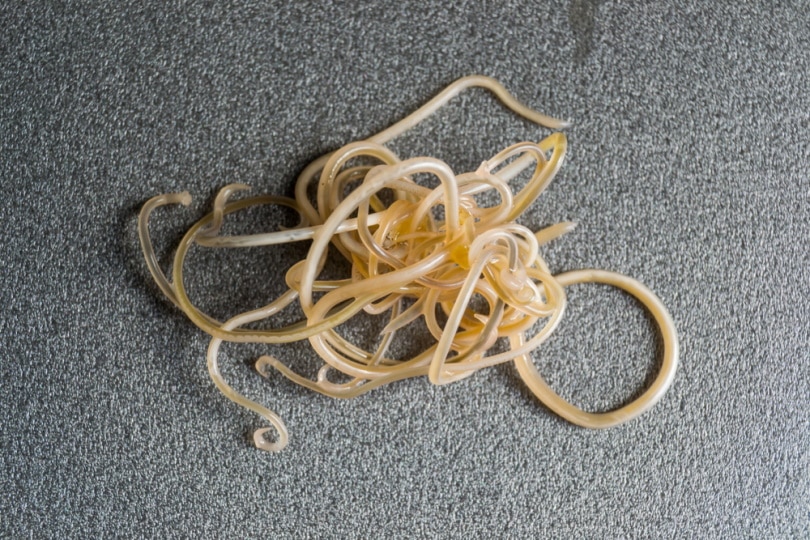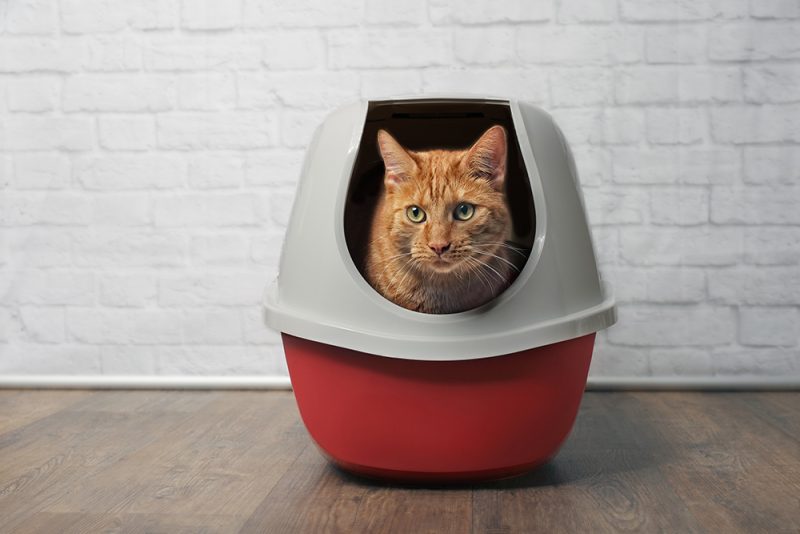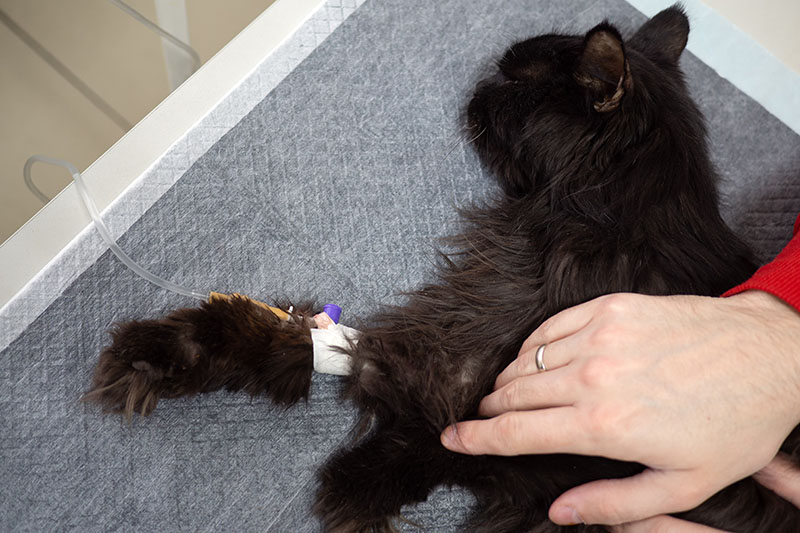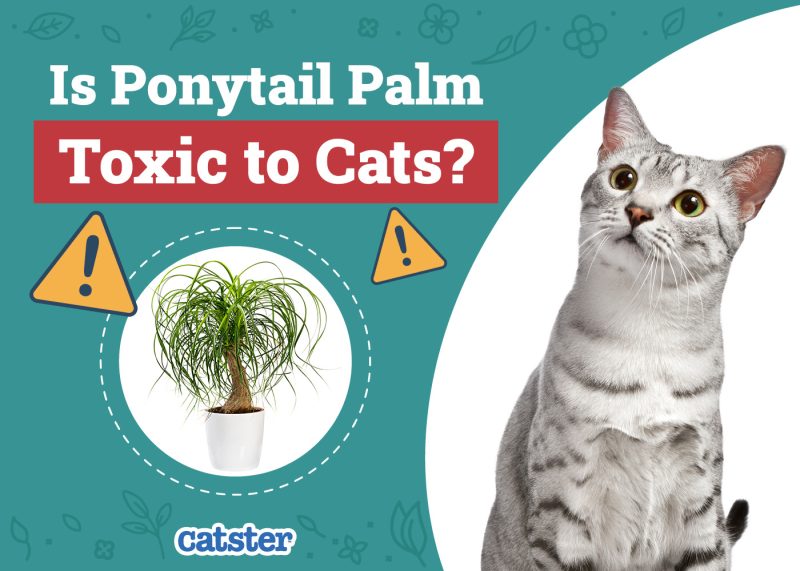It is unsettling to see your cat throwing up worms. After all, worms are not something that you expect to see when your cat vomits. Such a sight can leave you in a panic about what to do.
To help ease your mind a bit, when a cat throws up worms, they’re likely roundworms, which are treatable. That said, if you notice your cat throwing up worms, take them to the vet immediately for treatment, especially if they’re a kitten.
Now that you know why your cat is probably throwing up worms, read on to explore treatment options, the types of cats that can be seriously affected, and important tips for keeping your feline roundworm-free.

What Are Roundworms?
Roundworms are common intestinal parasites found in cats. In fact, many cats will experience roundworms at some point in their lives. They look like cooked spaghetti noodles, and if your cat is infested, you’ll see them in your cat’s feces or vomit. A roundworm’s body is long with a whitish or tannish appearance and a cylindrical shape. They can grow 3 to 6 inches long and are easy to spot with the naked eye. Roundworms do not attach to the intestinal wall, but rather swim freely throughout the intestines.
Cats usually get infested with roundworms or other parasites from swallowing dirt with larvae or worm eggs (usually in feces). Another possibility is if your cat walks through an infected area with larvae or eggs that can get on their paws. When your cat cleans themselves, they will likely swallow the larvae or eggs. In kittens, the worms are passed by an infested mother cat through her milk. Kittens are commonly affected by roundworms and other parasites.

How Serious Are Roundworms to Kittens and Senior Cats?
Roundworms are not terribly serious in an adult cat, though prompt treatment is required to get rid of them as soon as possible. They are more life-threatening for kittens and senior cats and should be treated ASAP. If left untreated, kittens and senior cats may die.
For treatment, your veterinarian will prescribe a dewormer to kill the worms. Fortunately, spotting roundworms in your infested kitten, adult, or senior cat is easy, as they are usually visible within your cat’s vomit or feces.
Did you know there's an enzyme cleaner that does it all? The Hepper Advanced Bio-Enzyme Pet Stain & Odor Eliminator Spray permanently removes the very worst smells and stains (truly, everything you can imagine!), and they offer a 100% satisfaction guarantee! Click here to get yourself a bottle.
At Catster, we’ve admired Hepper for many years, and decided to take a controlling ownership interest so that we could benefit from the outstanding products of this cool cat company!
What Are Signs of Roundworm Infestation in a Cat?
A telltale sign is spotting the worms in your cat’s feces or vomit, but other signs can also point to roundworm infestation. Signs of roundworms are as follows:
- Diarrhea with mucus
- Vomiting (worms may be visible in the vomit)
- Distended or enlarged belly (pot belly)
- Weight loss
- Coughing/pneumonia (if lungs are infected)
- Possible intestinal obstruction (severe cases)
- Dull coat
What Other Worms Can Infest Cats?
Roundworms are not the only worms that can affect your cat’s health. Hookworms, tapeworms, heartworms, and whipworms are all possibilities but also preventable and treatable.
- Hookworms “hook” themselves to the lining of the intestinal wall, hence the name. Hookworms feed on the blood and tissue fluids, which can result in anemia. Hookworms can enter a host through the mouth or skin and are not visible to the naked eye.
- Tapeworms have flat, segmented bodies that can reach up to 11 inches as adults. They anchor to the small intestines, and eventually, individual segments, called proglottids, break off from the main body of the worm and can be found on and around the anus, attached to fur underneath the anus, and on or in feces in the litter box.
- Heartworms infest the heart and are spread through mosquitoes. Dogs are more susceptible to heartworms than cats; nonetheless, getting your cat on heartworm medication is imperative to keep them from infesting your cat.
- Whipworms are not as common in cats as in dogs, but cats can still be infected. These worms resemble a “whip,” and an infestation can cause bloody diarrhea, or your cat may show no signs. However, the signs to look for are anemia, dehydration, and weight loss.
Are Worms Painful for Cats?
Yes, worms can be painful for your cat and can cause discomfort, especially depending on the type of worm your cat is infected with. Larvae migration that occurs in the liver, eye, stomach, or lungs can become inflamed, resulting in belly pain, nausea, breathing problems, and eye irritation due to excessive eye rubbing, a discharge, or squinting.
If you notice worms in the feces, vomit, or around the anus or if you see signs of worms in your cat, take them to the vet as soon as possible for treatment to prevent your cat from experiencing unpleasant clinical signs.
If you need to speak with a vet but can't get to one, head over to PangoVet. It's an online service where you can talk to a vet online and get the advice you need for your pet — all at an affordable price!

Can Humans Get Worms From Cats?
Unfortunately, yes, they can. Humans can get worms from coming in direct contact with cat feces with larvae, such as working in a garden without gloves, walking through contaminated soil, or children playing in sandboxes with contaminated feces. Practicing good hygiene is the best way to keep yourself protected.
The 7 Important Tips for Keeping Your Cat Worm-Free
You can do your part in preventing your cat from being infested with parasites by following some easy tips.
- Don’t allow your cat to hunt rodents, as some may already be infested, which will also infest your cat.
- Clean the litter box daily and ensure you remove all feces.
- Use a disinfectant when cleaning.
- Avoid feeding your cat raw meats, as larvae could be in the meat itself.
- Avoid areas with overcrowded pets.
- Keep your cat on a monthly heartworm and flea preventative.
- Keep your cat indoors as much as possible.


Conclusion
Discovering your cat has worms is never pleasant, but luckily, there are certain measures you can take to keep your cat worm-free. Ensure that you keep your cat on monthly heartworm and flea prevention, keep your cat indoors as much as possible, don’t allow your cat to hunt rodents, keep the litter box clean daily, and practice good hygiene to protect yourself.
Following these steps will greatly reduce the chances of your cat getting worms. For kittens, it is important to take your kitten for a thorough exam to ensure no worms are present.
Featured Image Credit By: Natata, Shutterstock




















